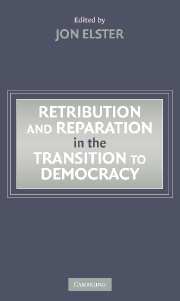Book contents
2 - How Far Back Should We Go? Why Restitution Should Be Small
from PART I - GENERAL ISSUES
Published online by Cambridge University Press: 03 December 2009
Summary
INTRODUCTION
How far back should we go when deciding to restitute? Does a theft or political crime cease to be morally relevant simply because it occurred in the very distant past? Should we care about each link in a long chain of thievery and oppression, should we care only about the most recent link, or should we care only about the first link?
Should the passage of time matter at all for moral claims?
The Hopi charge that their lands were stolen from them by the Navajo. If the United States government returns lands to the Navajo, should it also return some Navajo property to the Hopi?
In the post-Communist and transition economies, should we remedy only the injustices of the Communist era? Or should we go much further back and try to rectify previous injustices as well? Should it matter that the nobles virtually enslaved the Russian peasantry? Should it matter that the Ghenghis Khan sacked Baghdad in 1258?
Everyone living today, if he or she goes back far enough, can find ancestors who were oppressed and victimized. Few land titles have been acquired justly. Subsequent corporate assets have been built on stolen land or generated by investments on originally stolen land endowments.
The choice of time horizon for restitution becomes especially important to the extent we compound past losses at positive interest.
- Type
- Chapter
- Information
- Publisher: Cambridge University PressPrint publication year: 2006
References
- 4
- Cited by



